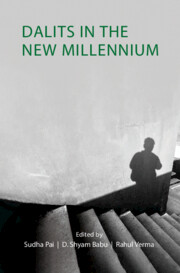Book contents
- Frontmatter
- Contents
- List of Figures
- List of Tables
- Acknowledgements
- 1 Introduction: Dalit Discourse in the New Millennium
- Part I Shifting Patterns of Electoral Politics
- Part II Popular Culture, Discourse, and Protest
- Part III Transformations in Ideology and Identity
- Part IV Aspirations and Anxieties
- Part V Discrimination and Representation
- About the Contributors
- Index
1 - Introduction: Dalit Discourse in the New Millennium
Published online by Cambridge University Press: 12 July 2023
- Frontmatter
- Contents
- List of Figures
- List of Tables
- Acknowledgements
- 1 Introduction: Dalit Discourse in the New Millennium
- Part I Shifting Patterns of Electoral Politics
- Part II Popular Culture, Discourse, and Protest
- Part III Transformations in Ideology and Identity
- Part IV Aspirations and Anxieties
- Part V Discrimination and Representation
- About the Contributors
- Index
Summary
The rapid economic and political shifts that have taken place in India in the last three decades have brought about considerable change in the lives of Dalit citizens. This is not to suggest that the social pyramid has been turned upside down as Dalits continue to face discrimination on everyday basis. Some level of progress across domains, however, is amply visible. The political assertion of the 1990s has brought about change in self-perception and renewed self-confidence. Similarly, some degree of economic mobility has made at least a section of Dalits better off than they were a generation ago. There has also been a spate of academic writings on Dalit movements and politics in the recent past, which has brought ‘Dalit Studies’ to the mainstream. Yet the academic lens to study Dalit social and political reality has largely remained the same, rooted in the static axes of oppression and the oppressed. Through the chapters in this volume, we present a much more nuanced picture of key changes and contemporary challenges in Dalit politics beyond existing frameworks. While the immediate post-independence period has not been ignored, our focus is on the dawn of the new millennium, which not only constitutes a defining phase in Indian politics, but also in the cultural, social, and political life of Dalits. The central argument that binds this volume is that in the backdrop of the Bharatiya Janata Party's (BJP) ascendance to power at the national level, Dalit politics has acquired a more complex character which necessitates revisiting many scholarly formulations theorized earlier. We are witnessing the emergence of a new political economy; there is a need to make sense of what this means for the Dalit movement and political parties, and how they have reacted to it.
The rise of the BJP under Narendra Modi has received some serious scholarly attention. For example, Chatterji, Hansen, and Jaffrelot's (2019) edited volume addresses the construction of Hindu nationalism, the ‘deep’ majoritarian state, right-wing hegemony, and their impact on disadvantaged sections and minorities. Similarly, a collection of essays edited by Vaishnav (2019) analyses the BJP's 2014 victory, its core ideological beliefs, economic policy, and impact on secularism.
- Type
- Chapter
- Information
- Dalits in the New Millennium , pp. 1 - 22Publisher: Cambridge University PressPrint publication year: 2023



